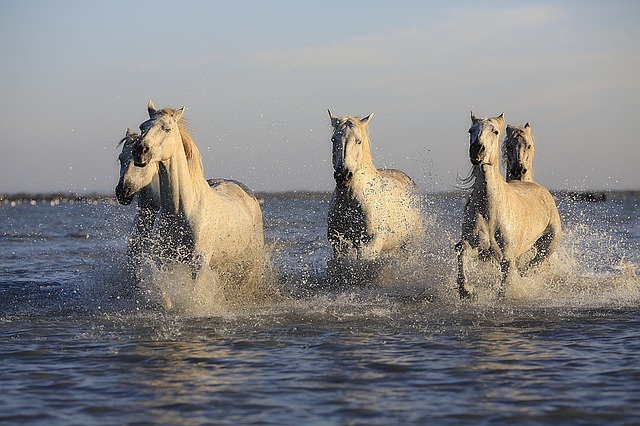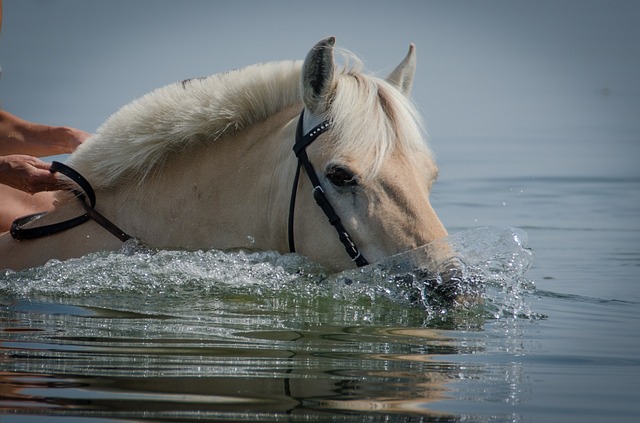A very common question we get asked is, can horses swim? Yes, horses can swim and are very good swimmers, however they often need a little bit of encouragement at first to get into the water. Swimming is one of the most beneficial aerobic exercises for horses and helps engage the horse’s whole body at once, without bearing weight. As long as you have a quality horse stable for your horse to rest and warm up in after his swim, you’re set to help your horse enjoy the benefits of swimming!
Just as doctors may prescribe swimming for adults in rehabilitation, a veterinarian will also prescribe the same treatment for a horse. So, we thought we’d answer the question, can horses swim? and explain some of the benefits with you.
Can Horses Really Swim?
There are few things horses enjoy more on a hot day than the exhilaration of a swim in cool water, whether that’s a pool, river, or the ocean. Swimming with horses is nothing new, but it has been developed over the years for use in training and rehabilitation facilities for injured or traumatised horses. Horses are strong swimmers and encouraging your horse to swim regularly can have a number of significant health benefits.
The Benefits of Exercise Pools
Equine therapy pools have been a mainstream form of exercise and treatment for horses for a long time now and are becoming increasingly part of regular training programmes. Exercising your horse in an equine pool is a beneficial and safe way of keeping him fit and healthy while also helping him heal from any injuries he may have experienced.
Rod Fisher, a well-known endurance veterinarian points out that the application of underwater treadmills for horses into regular fitness programmes is a ‚Äúuseful form of exercise without putting a strain on joints.‚ÄĚ We would highly recommend swimming for your horse as it reaps a number of significant benefits.
Swimming Strengthens Muscles and Tendons
In a typical workout, your horse will only use 60-70% of his muscles. Many horse exercises help achieve desirable performance and positioning, however repeated workouts that do not allow the horse’s muscles to fully lengthen can cause spasms and stiffness.
Swimming in contracts stretches the horse’s body as his stride lengthens to help keep his body afloat in the water. The elongation of muscles that swimming encourages helps prevent muscle spasms or stiffness and instead encourage flexibility and balance. A horse that is exercised in a swimming pool will gain stronger muscle and endurance than a horse working on the ground. One of the reasons for this is because water holds more resistance and therefore requires harder work.
Swimming Helps Treat Tendon Injuries

Another benefit of swimming for horses is its effective treatment of tendon injuries. Horse’s tendons are made of fibrous tissue that is very strong and connects muscles to bones. These tendons act like springs in the body, absorbing force on the bones during movement. As a result, tendons typically carry a lot of the horse’s weight and are much more prone to injury than other areas of the body.
Swimming is a fantastic treatment for horses who have experienced tendon injury as it allows the horse to exercise and maintain muscle tone and flexibility without putting pressure on the injury.
Improves Cardiovascular and Respiratory Systems
Another swimming benefits horses is in their cardiovascular and respiratory systems. One of the best ways to improve cardiovascular fitness in a horse is with regular exercise and swimming is one of the best all-round exercises to do this with.
Swimming is an aerobic exercise and has been known to increase the health of the heart by helping it contract and relax more efficiently through low-impact exercises.
By increasing the health of the heart, it is able to work more effectively, and the lungs are required to work faster to take in more oxygen. The respiratory and cardiovascular systems compliment each other, which means that by improving one, you can increase the efficiency of the other. Swimming is a very effective cardio exercise and helps increase both the cardiovascular and respiratory systems so that you horse can build a strong heart and lungs.
How Does Swimming Benefit a Horse Psychologically?
When a horse has been injured, he can often experience trauma, shock, or fear. The most commonly prescribed treatment for an injured horse is medication, stall rest, and very brief periods of exercise. However, this isn‚Äôt always what‚Äôs best as during the recovery period, the horse that is confined to the stall can become unfit, lose muscle tone, and even go a little bit stir crazy ‚Äď and who can blame it?
Horses require physical exertion and stimulation for both their body and their mind. Swimming a horse on stall rest can be a great way to help keep his muscle tone and fitness levels up, while also providing him with mental and physical stimulation and allowing his body to heal from the injury. Of course, it is important to remember that every horse’s injury is different and sometimes it is best not to exercise the horse at all, instead keeping him on stall rest until he is better. Always follow the advice of your veterinarian first.
Swimming and The Benefits of Rubber Matting
When adding regular swimming training into your horse’s exercise routine, it is important your take note of the provisions you need to make. One piece of stable equipment that we would highly recommend for swimming horses is rubber matting.
In addition to being a great alternative to straw bedding in the stable, rubber matting is a fantastic flooring to use while washing your horse down after his swim. Easily cleaned, rubber matting stops your horse from sliding around on the floor by providing good grip for him to stand safely after coming out of the water. What’s more, it gets rid of the problem of a wet stall as it does not become mouldy or wet like straw and can be easily wiped down and dried after you have tended to your horse. If you’ve not considered rubber matting for your stable, we would highly recommend it if you regularly take your horse swimming!
Start Your Horse in Shallow Water
Whether your horse is afraid of the water or has experienced a trauma around open water, it is best to introduce your horse to swimming as slowly as you can. One of the best ways to do this is by starting your horse off in shallow water and working your way up. Always go at a pace your horse is comfortable and ensure he feels safe and comfortable at all times so that he does not panic, buck, or freak out. When teaching your horse to swim, starting him off in shallow water is one of the best ways to familiarise him and let him know that the water can be a safe space for him to enjoy.
Train Your Horse Safely with Swimming
For horses, training on hard surfaces and standing all day can really take its toll. Swimming is a great way to reduce aches and pains, keep your horse fit, and even help with the healing process. By adding swimming into your horse’s regular exercise routine, you will help improve his physical and mental wellbeing, reduce the likelihood of injury, and keep your horse healthier and happier for longer.
Always Seek the Advice of Your Veterinarian
One of the most important things you can do for yourself and your horse when starting a new exercise regime, especially swimming, it is integral you seek the advice of your veterinarian. Your vet will be able to check your horse over, decide whether or not swimming would be appropriate for him, and check that his injuries could benefit from regular aerobic exercises. Your veterinarian will guide you through the process and ensure you pursue swimming for your horse in a safe and effective way.
Contact Us Today
If you found this article exploring if horses can swim educational and it brought up additional questions, please reach out to the friendly experts at Prime Stables. With years of equine experience, our knowledgeable team looks forward to assisting with any questions as you consider aquatic activities with your horse. Call 01403 823836 today or submit your query online here.


